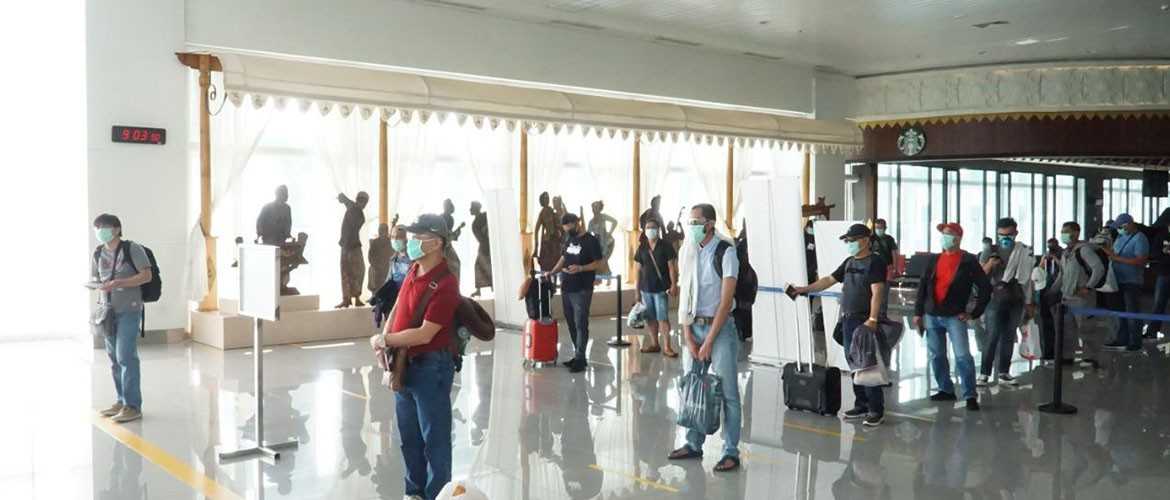17 May 2020
Back to List
JAKARTA - Angkasa Pura Airports is ready to follow the instruction from SOE Minister Erick Tohir stipulated in Letter No.S-336/MBU/05/2020 to begin compiling COVID-19 Health Guidelines for the ‘new normal’ implemented at its 15 airports. The guidelines still referring to health protocols issued by COVID-19 rapid response team. Trough the joint movement #CovidSafeBUMN, Angkasa Pura Airports is optimistic that SOEs can inspire public to welcome and adapt to new normal going forward.
"Angkasa Pura Airports, as a SOE that drives the national economy, is creating COVID-19 Health Guidelines and timeline for implementing new normal related to safety and health, both for passengers, the public, commercial partners, airlines, cargo and all airport stakeholders while still covering human aspects, procedures, relations to customers, partners, and other stakeholders which refer to the instruction of COVID-19 rapid response team and Large-Scale Social Restrictions (PSBB) applied in the company’s operation area,” said Angkasa Pura Airports president director Faik Fahmi.
Since the outbreak of COVID-19, Angkasa Pura Airports has made various efforts to prevent and break the chain of COVID-19 transmission. One of them is by forming an Internal Task Force Team through PT Angkasa Pura I (Persero) Board of Directors Decree No.SKEP.29/LB.05.01/2020 on the Establishment of COVID-19 Impact Prevention and Management Team at PT Angkasa Pura I (Persero) on March 13, 2020. The team is in charge for giving instruction on prevention of COVID-19 impact which covers policies in the operations, engineering, marketing & services, business development, finance, human resources & general and secretariat.
"Specifically, this team provides recommendation on strategic policy to the management in taking proper, effective and measurable decisions in an effort to prevent and break the chain of COVID-19 transmission within Angkasa Pura I‘s environment. The team works nonstop to conduct direct monitoring in the field so that efforts to prevent and control the spread of COVID-19 can run optimally,” Faik said.
Angkasa Pura Airports always coordinate with the Port Health Office (KKP) in tightening international passenger screening through body temperature checks using thermal scanners and thermal guns, disseminating information about preventing the spread of COVID-19 at its 15 airport, conducting simulation on handling suspected COVID-19 passengers. In addition, public areas at the airports and administrative offices are also provided with hand sanitizers and regularly (one to four times a day) sprayed with disinfectant.
As for operational staff at the airport, the company requires the use of personal protective equipment (PPE) such as googles, N95 masks, gloves, as well as hand sanitizers. In addition, physical distancing is also implemented at all airports operated by Angkasa Pura Airports of minimum one meter in public service area by putting stickers on the floor.
"Since March 17, 2020, we have also implemented work from home (WFH) for [employees] at Jakarta headquarters, 15 airport branch offices and five subsidiaries, especially for administrative employees. To support WFH and digital remote working, Angkasa Pura Airports optimizes the use of office collaboration platform as an effort to improve performance and productivity as well as our commitment to prioritize the health of all Angkasa Pura Airports staff and protect them from COVID-19 transmission,” Faik said.
When Transportation Ministry allowed restricted flights during the period of Ramadan exodus ban on May 7, all airports managed by Angkasa Pura Airports directly prepared operational regulatory mechanisms so that the health protocols for preventing the spread of COVID-19 could be optimally implemented. This can be seen from the arrangement of passenger departure flow at the airport which requires passengers to pass five checkpoints. Minimum distance and documents check are set to prevent overcrowding.
Below is the details of the checkpoints:
1. Departure Entrance Checkpoint
2. Health Documents Checkpoint
3. Final Documents Check
4. Check-in
5. Checkpoint Before SCP 2
Passengers who already have boarding pass will have their documents rechecked by Aviation Security (Avsec) officers before going through SCP 2 inspection.
After passing checkpoint five, prospective passengers can proceed to body and goods inspection in SCP2 and then enter the waiting room. It has to be noted that should incomplete documents found at each checkpoints, passengers are not allowed to proceed to the next checkpoint.
Various efforts to implement health protocols related to prevent the spread of COVID-19 received appreciation from SOE Minister Erick Thohir during a working visit to the General Ahmad Yani International Airport in Semarang, on Saturday, May 16.
"We are committed to being able to provide flight services in these limited conditions through the preparation of health protocols and strategies in anticipating the new normal by observing health protocols on prevention of COVID-19 spread and other derivative regulations which refer to SOE Ministry policy, commands from ministry or relevant agencies related to the conditions of the aviation industry. With the joint movement #CovidSafeBUMN within the SOE Ministry, we are optimistic that we can face the new normal well together,” Faik added.
Up
